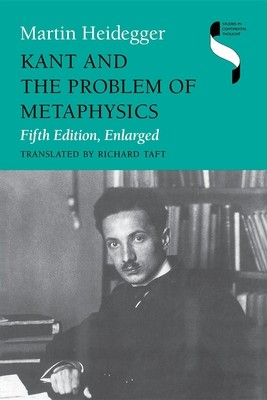
- We will send in 10–14 business days.
- Author: Martin Heidegger
- Publisher: Indiana University Press
- ISBN-10: 0253210674
- ISBN-13: 9780253210678
- Format: 15.6 x 23.5 x 2 cm, minkšti viršeliai
- Language: English
- SAVE -10% with code: EXTRA
Kant and the Problem of Metaphysics, Fifth Edition, Enlarged (e-book) (used book) | bookbook.eu
Reviews
Description
Since its original publication in 1929, Martin Heidegger's provocative book on Kant's Critique of Pure Reason has attracted much attention both as an important contribution to twentieth-century Kant scholarship and as a pivotal work in Heidegger's own development after Being and Time. This fifth, enlarged edition includes marginal notations made by Heidegger in his personal copy of the book and four new appendices--Heidegger's postpublication notes on the book, his review of Ernst Cassirer's Philosophy of Symbolic Forms, Heidegger's response to reviews by rudolf Odebrecht and Cassirer, and an essay "On the History of the Philosophical Chair since 1866." The work is significant not only for its illuminating assessment of Kant's thought but also for its elaboration of themes first broached in Being and Time, especially the problem of how Heidegger proposed to enact his destruction of the metaphysical tradition and the role that his reading of Kant would play therein.
EXTRA 10 % discount with code: EXTRA
The promotion ends in 23d.00:37:41
The discount code is valid when purchasing from 10 €. Discounts do not stack.
- Author: Martin Heidegger
- Publisher: Indiana University Press
- ISBN-10: 0253210674
- ISBN-13: 9780253210678
- Format: 15.6 x 23.5 x 2 cm, minkšti viršeliai
- Language: English English
Since its original publication in 1929, Martin Heidegger's provocative book on Kant's Critique of Pure Reason has attracted much attention both as an important contribution to twentieth-century Kant scholarship and as a pivotal work in Heidegger's own development after Being and Time. This fifth, enlarged edition includes marginal notations made by Heidegger in his personal copy of the book and four new appendices--Heidegger's postpublication notes on the book, his review of Ernst Cassirer's Philosophy of Symbolic Forms, Heidegger's response to reviews by rudolf Odebrecht and Cassirer, and an essay "On the History of the Philosophical Chair since 1866." The work is significant not only for its illuminating assessment of Kant's thought but also for its elaboration of themes first broached in Being and Time, especially the problem of how Heidegger proposed to enact his destruction of the metaphysical tradition and the role that his reading of Kant would play therein.


Reviews